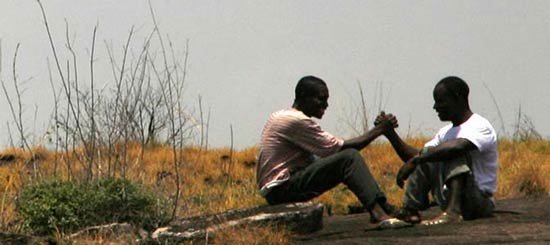Fambul Tok
My latest feature story has been published in PRISM, focused on Fambul Tok, a community-led peace and reconciliation movement in Sierra Leone. The country endured a brutal eleven-year civil war, and Fambul Tok is helping communities to heal again, not relying primarily on outside resources and ideas, but on a long-held tradition within Sierra Leone’s culture that takes place around community bonfires.
I’m convinced this story can teach all of us a lot about peace, forgiveness, and reconciliation in our increasingly fractured, violent world. Here’s how the story begins:
Sahr and Nyumah grew up as best friends. But that was before the war.
While attempting to flee their village in eastern Sierra Leone when invading rebel forces attacked it in 1991, the two boys were captured and ordered to kill. Sahr was given a knife and told to murder his own father. He refused. The knife was given to Nyumah, and a gun was put to his head. Once he had killed Sahr’s father, Nyumah turned and beat Sahr to a pulp.
This was war, and it would be an 11-year nightmare.
When a peace treaty was eventually signed, those who survived the war did their best to return to life as usual. Villages that had been burned to the ground had to be rebuilt from scratch. Families and their ways of life had to be pieced back together. Many returned home accompanied by the ghosts of amputation, an enduring reminder of the gruesomeness of war. Thousands of combatants who had grown old against their will at the ages of 10, 11, 12 struggled to reclaim the innocence of childhood. For too many it was too late. Tens of thousands of women and girls carried with them the silent shame of violation. And for all the obvious wounds, a myriad more lay just below the surface, largely unacknowledged—but simmering.
The highly touted Truth and Reconciliation Commission, intended to help the people of Sierra Leone find closure, found some success here and there, but it never reached rural villages like Gbekedu, where Sahr and Nyumah lived. Villagers were left without a sense of justice, and though guns and machetes had for the time being been set aside, true peace had not yet been fully restored.
These communities, however, had a tradition—a memory from before the war. In a simpler time, after the day’s work had been done, village residents would gather around a bonfire for a time of “family talk,” or fambul tok in the Krio language. They would discuss whatever was on their minds, and together, led by village elders, they would resolve any disputes that had arisen during the day.
It was at one such gathering, years after the war, where Sahr finally found the words and the audience he needed to be able to speak out. After courageously telling the truth about what he and his family had endured, he went a step further, declaring, “The man who beat me and killed my father is here.”
Hobbling over to the edge of the circle on his permanently crippled legs, he reached into the crowd and pulled Nyumah out of the shadows and into the flickering light.
Sahr and Nyumah had not spoken in the years since the rebels invaded and their lives were torn apart. But around that bonfire, face to face with Sahr and in the sight of all, Nyumah confessed to his crime in stark, grisly detail.
“But what I did,” he continued, “it was not my choice.”
Then, bowing to the ground and putting his hands in the dirt, he asked Sahr to forgive him. Without hesitation, Sahr granted forgiveness. The two embraced and began to dance as the community burst into exuberant song, voices rising into the night, swirling like sparks.
Continue reading the story here.
Learn more about the Fambul Tok book and film, and about Fambul Tok International.
[Photo credit: Sahr and Nyumah after participating in a Fambul Tok reconciliation ceremony. Photo by Sara Terry via fambultok.com]
